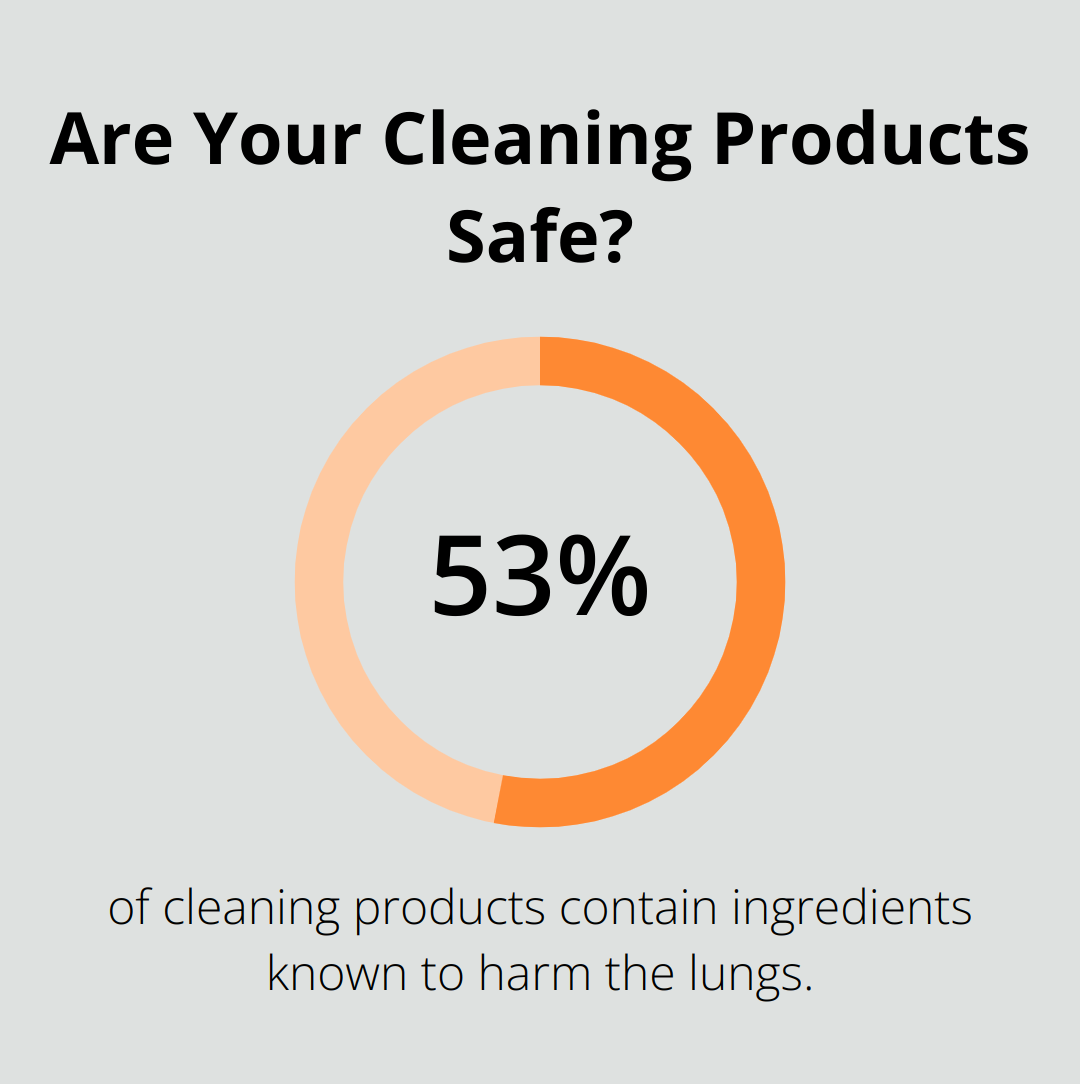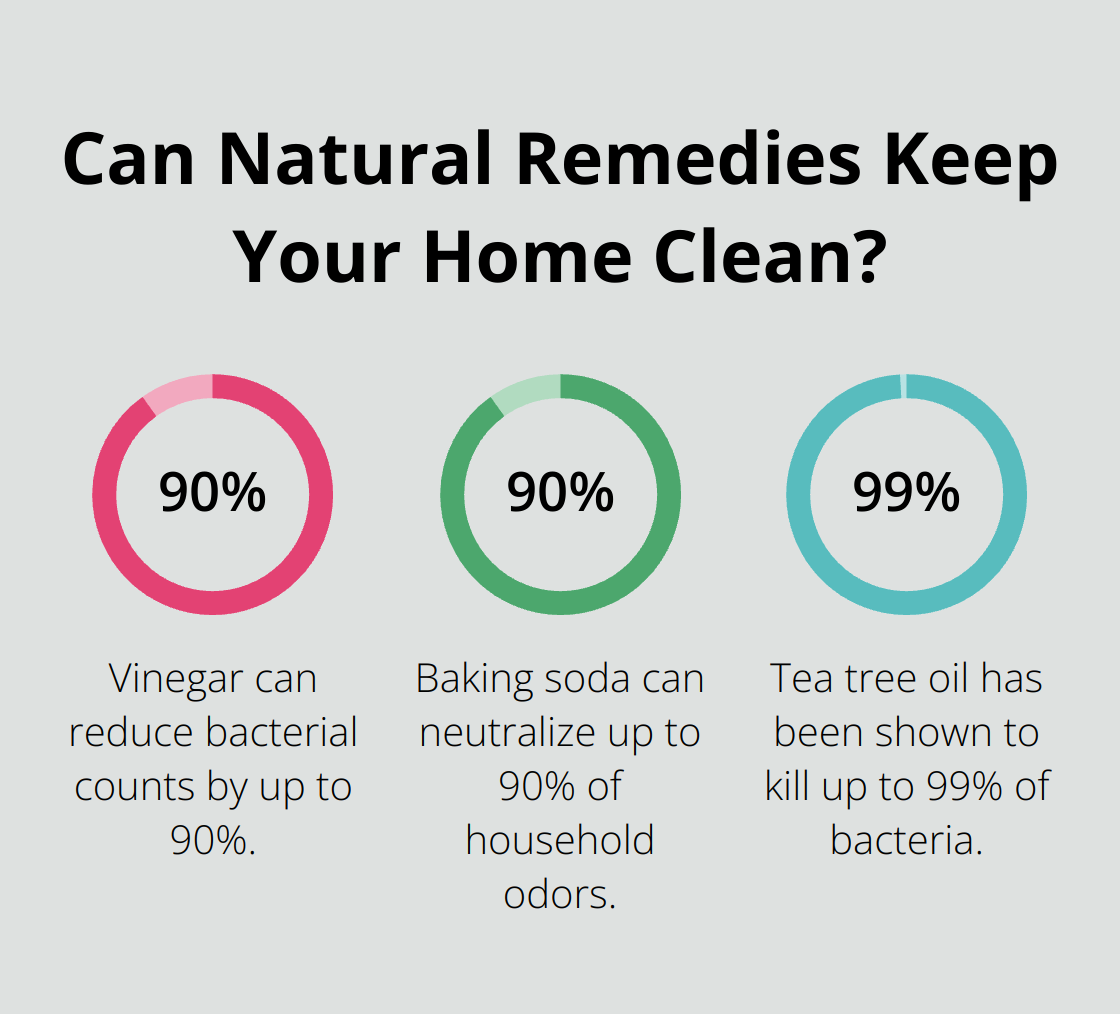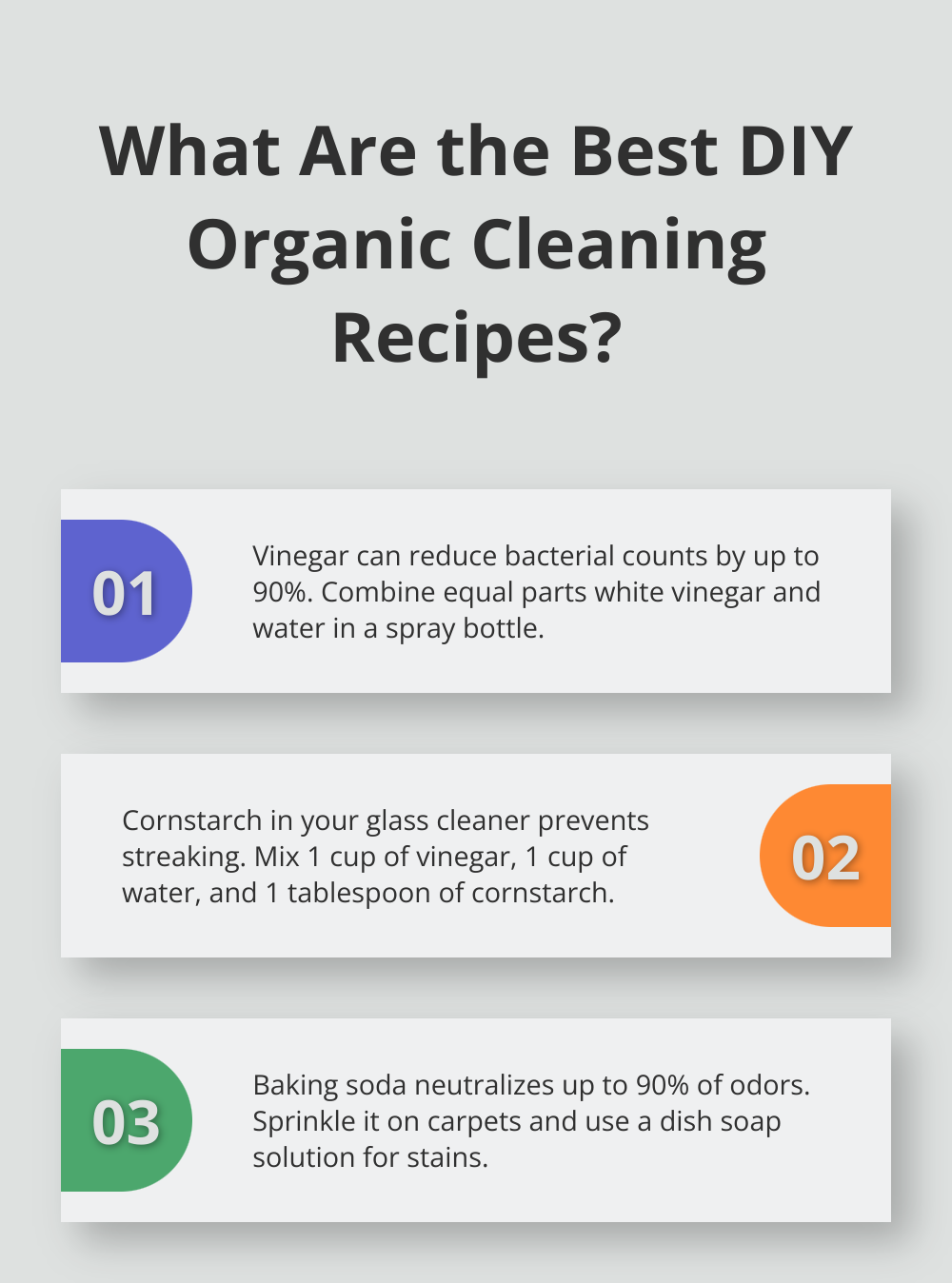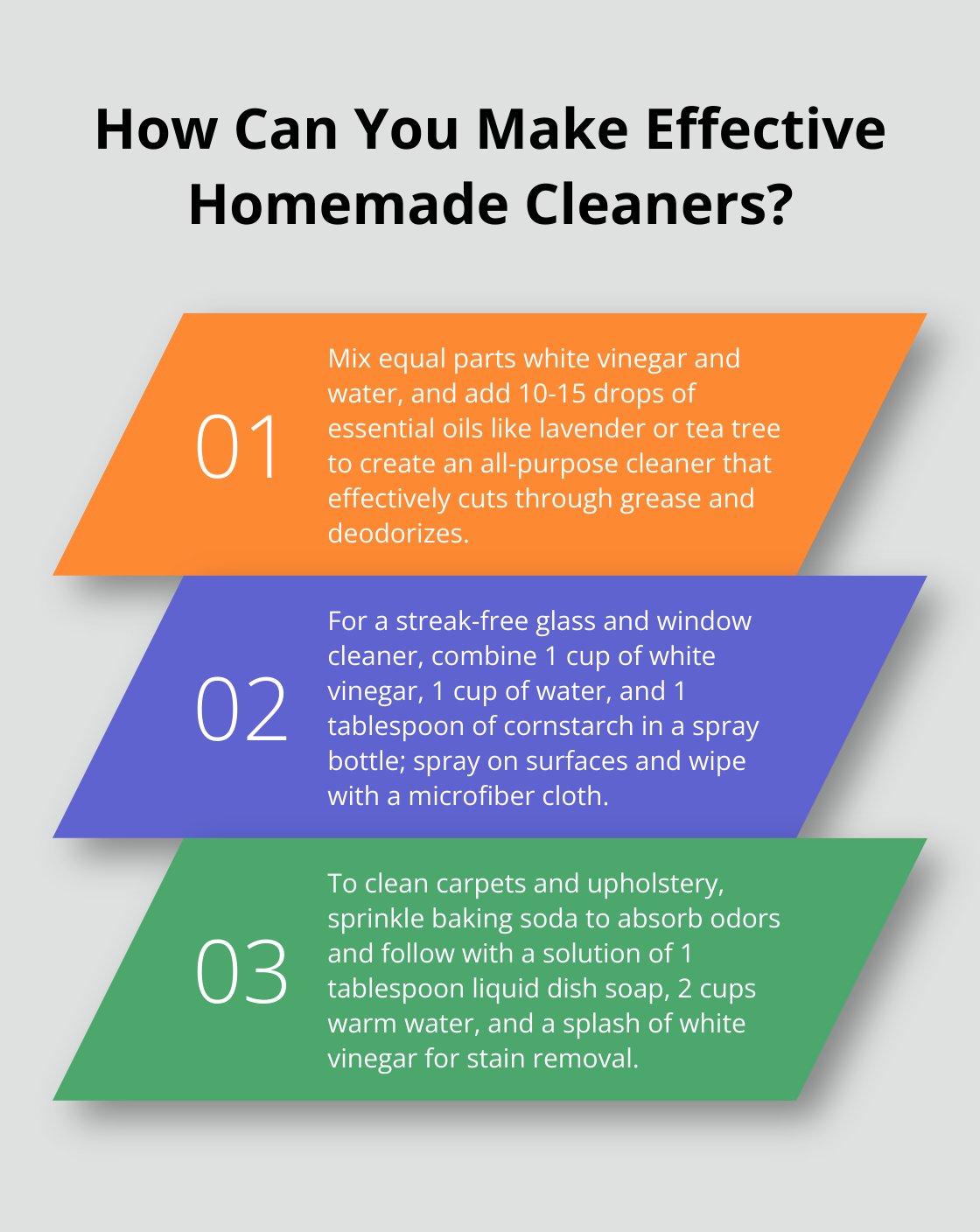Organic cleaning solutions are gaining popularity for their health benefits, environmental impact, and cost-effectiveness.
At The A Team Cleaning Services, we believe in sharing simple and effective DIY recipes that you can easily create at home.
Our guide will help you transition to safer and more sustainable cleaning practices without breaking the bank.
Dive into our best practices and recipes to experience the difference.
Why Choose Organic Cleaning
Transitioning to organic cleaning methods offers tangible benefits that go beyond just a cleaner home.
Health Benefits of Organic Cleaning Products
Health hazards tied to traditional commercial cleaners are well-documented. A study by the Environmental Working Group found that 53% of cleaning products contain ingredients known to harm the lungs, and some detergents have cancer-causing agents. By switching to organic cleaning solutions, you eliminate exposure to harsh chemicals that can trigger allergies, asthma, and other respiratory issues. Ingredients like white vinegar, baking soda, and essential oils are not only non-toxic but also effective.
Environmental Impact Reduction
The environmental footprint of commercial cleaning products is substantial. According to the EPA, volatile organic compounds (VOCs) from these products contribute significantly to air pollution and water contamination. Organic cleaning products, however, utilize biodegradable ingredients that break down naturally without harming the ecosystem. Moving to homemade cleaners can decrease your household’s chemical output, playing an essential part in environmental conservation. For more on this, check our sustainable cleaning tips.
Cost-Effectiveness Compared to Commercial Cleaners
Financially, organic cleaning is a smart move. Commercial cleaners can be expensive, with costs adding up over time. In comparison, raw materials for DIY cleaners—such as vinegar, baking soda, and essential oils—are affordable and widely available. For instance, a gallon of white vinegar, costing about $3, can replace multiple types of cleaners and last much longer. You’ll find that transitioning to DIY cleaners can drastically cut down your household cleaning budget. Take a look at our comprehensive guide on biodegradable cleaning products to get started.

By choosing organic cleaning solutions, you gain control over both the health of your home and its environmental impact—all while saving money.
Essential Ingredients
Vinegar as a Cleaning Powerhouse
White vinegar stands out as a powerhouse in organic cleaning. Its acidity makes it incredibly effective for breaking down grease, killing bacteria, and dissolving mineral deposits. According to the National Library of Medicine, vinegar can reduce bacterial counts by up to 90%. Use it for wiping down kitchen counters, cleaning mirrors, or sanitizing bathroom surfaces. Another tip: mix equal parts vinegar and water in a spray bottle for an all-purpose cleaner that can tackle most household surfaces.
The Versatility of Baking Soda
Baking soda is another multi-functional ingredient that should be in every DIY cleaner’s arsenal. Its mild abrasiveness makes it perfect for scrubbing without scratching surfaces. It’s excellent for deodorizing too. The American Cleaning Institute reports that baking soda can neutralize up to 90% of household odors. For clogged drains, a combination of baking soda followed by vinegar creates a fizzy reaction that helps to clear the blockage. Sprinkle baking soda on carpets, let it sit for 15 minutes, then vacuum to freshen up your floors.
Essential Oils: Scent and Sanitation
Essential oils not only provide pleasant scents but also come packed with antibacterial properties. For example, tea tree oil has been shown to kill up to 99% of bacteria, as documented in studies by the University of Western Australia. A few drops of lemon or lavender oil can be added to homemade cleaners to enhance their effectiveness and leave your home smelling fresh. Be sure to use essential oils wisely and keep them away from pets and children, as they can be potent.

Using these ingredients can revolutionize the way you clean. Check out our guide on eco-friendly cleaning products for more detailed information.
Pro Tips for Mixing Ingredients
Properly mixing these ingredients can amplify their effectiveness. Always add vinegar and baking soda to water-based mixtures separately to avoid neutralizing their cleaning power. Use glass containers when storing cleaners made with essential oils, as they can degrade plastic over time. By mastering these mixing techniques, you can create potent cleaning solutions that outperform many commercial products.
Adopting these practices can lead to a cleaner, more sustainable home environment while saving you money. Transition to organic cleaning and experience the tangible benefits firsthand.
Next, we will explore some tried-and-tested organic cleaning recipes.
What Are the Best DIY Organic Cleaning Recipes?
All-Purpose Cleaner
Creating your own all-purpose cleaner is straightforward and offers immense benefits over commercial products. Combine equal parts white vinegar and water in a spray bottle. For added fragrance and antibacterial properties, add 10-15 drops of essential oils like lavender or tea tree. This cleaner cuts through grease, deodorizers, and works on most surfaces. A study by the National Library of Medicine found that vinegar can reduce bacterial counts by up to 90%. Use this solution on kitchen counters, bathroom surfaces, and even floor spills.
Glass and Window Cleaner
For a streak-free glass cleaner, mix 1 cup of white vinegar, 1 cup of water, and 1 tablespoon of cornstarch in a spray bottle. The cornstarch helps to prevent streaking and gives your windows a crystal-clear finish. An experiment by the North Carolina Department of Public Health showed that vinegar-based cleaners are as effective as commercial options in removing basic grime. Spray the solution on windows or mirrors and wipe clean with a microfiber cloth. Unlike ammonia-based cleaners, this recipe is safe for homes with pets and children.
Carpet and Upholstery Cleaner
Cleaning carpets and upholstery can be done efficiently with baking soda and a simple liquid soap solution. Sprinkle baking soda liberally over the carpet or upholstery to absorb odors and pre-treat stains. After letting it sit for 15 to 30 minutes, mix a tablespoon of liquid dish soap with 2 cups of warm water and a splash of white vinegar. Blot the mixture onto stained areas using a clean cloth. According to the American Cleaning Institute, baking soda neutralizes up to 90% of household odors. For deeper cleaning, use a handheld carpet cleaner with this solution.

Adopting these DIY recipes can significantly improve your cleaning routine. For more information on how to clean efficiently with natural products, visit our guide on natural cleaning techniques.
Conclusion
Switching to DIY organic cleaning offers numerous benefits. By using ingredients like white vinegar, baking soda, and essential oils, you protect your health and the environment and save money. These natural components not only work effectively but also reduce your household’s chemical footprint.

DIY organic cleaning is simple and rewarding. From all-purpose cleaners to glass and window solutions, the recipes we shared make it easy to start your journey. Considering studies show the effectiveness of these natural ingredients, their health and environmental advantages are clear.
Consistency is key in maintaining a clean and healthy home. Regular use of organic solutions will keep your living spaces fresh and inviting. Remember, while these homemade cleaners are safe, using them correctly is important. Always mix and store your solutions properly for the best results and safety.
For those times when you need a professional touch, we at The A Team Cleaning Services are here to help. Our expert cleaners utilize high-quality products and equipment to deliver exceptional cleanliness. Discover the convenience and peace of mind that come with a pristine home by visiting The A Team Cleaning Services.
Transitioning to organic cleaning is a step towards a healthier, more sustainable lifestyle. Enjoy the benefits of cleaner, safer living spaces with DIY solutions, and rely on professional services when needed for the best of both worlds.
